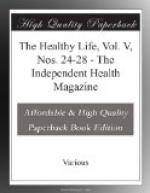Such are the certain physiological advantages which the predominant use of vegetable products are capable of offering. If one takes the pure energy-producing point of view, the superiority of the vegetarian diet becomes greater still. From the fine works of A. Chauveau, modern physiology has shown us that muscle, in working, consumes sugary materials. These are provided by ingestions of sugar in a natural state, of dextrine or of starch; for a less important part, the glycogen of the system may also arise from hydrocarbonated cords existing in the molecule of certain albumins. Therefore it is only in an infinitesimal part, due to the fibrine of meat, and to the small proportions of glycogen which it contains, that flesh diet intervenes in the direct production of kinetic energy.
The demonstrations which have been essayed, touching the muscular superiority of vegetarians, appear superfluous to us. Such experiments could only have a positive value if they were made on both series of antagonistic subjects, with alimentary powers of energy-producing equality.
It should be distinctly understood that the vegetarian does not profit by any mysterious forces. The habit of preferring to nourish oneself with vegetable foods, can, at most, or at least, favour the physiological integrity of the subject, shield him against disease and assure his revictualment with foods recognised as active and easily measurable.
One cannot leave alcohol out of the list of advantageous vegetable foods. In fact, provided one keeps to strictly limited doses, it may be included among the alimentary foods, on a footing comparable to that of sugar. If one knew how to use without misusing it, alcohol might become a daily food.
X
Another order of ideas which one cannot pass by in silence at the present time militates in favour of vegetable alimentation. Dietetics cannot neglect economic problems. A flesh diet is very costly. In large towns, like Paris, at a time when everything is increasing in cost, one must be favoured by fortune to be able to indulge in the real luxury of consuming the calories of meat. As we said in 1905, with Prof. Landouzy and M. Labbe, in our inquiry into popular Parisian alimentation, the calorific energy of meat comes, on an average, to between 15 to 20 times dearer than that of bread or pulse foods.
The diet with a vegetable predominance may therefore, by those who adopt it, be considered as much less costly than a mixed one. Does not this fact, then, deserve to be taken into consideration and compared—startlingly illustrative—to the ingenious calculation recently made by Lefevre in his examination of vegetarianism? One acre of land planted for the purpose of breeding cattle produces three times less living strength than an acre planted with wheat!
Is it not criminal, or at any rate ill-judged,




